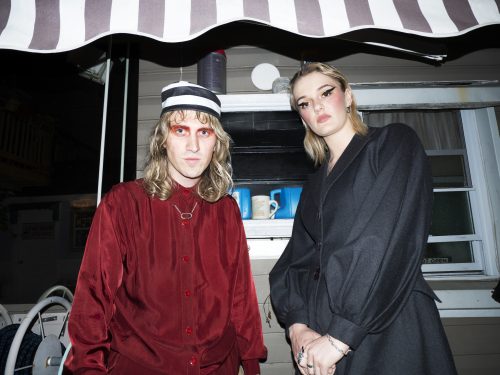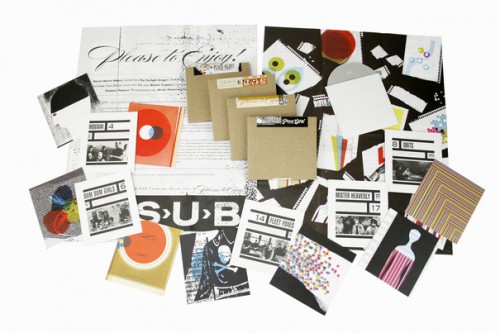When you think of Japanese culture, you probably don’t picture a long-haired, American heavy metal guitar god. But six-string virtuoso Marty Friedman, who moved to Tokyo from the U.S. 15 years ago, has not only been embraced by the Japanese — he’s been tabbed to help spread the word about the country’s cultural heritage.
Friedman, who has become a TV star in Japan, is back in the US for a headlining tour supporting “One Bad Bad M.F. Live!!” which he released late last year, including Friday night’s show at Saint Vitus in Brooklyn. He also completed a biography and a documentary, which fans should keep an eye out for.
“One Bad MF” is Friedman’s 14th solo release since he spent a decade with US thrash metal group Megadeth, playing a key role on both the band’s most musically adventurous album, 1990’s “Rust In Peace,” and its most commercially successful, 1992’s “Countdown to Extinction.” On the live record, captured at Centro Cultural in Mexico City last April, he’s backed by Kiyoshi (bass), Jordan Ziff (guitar) and Chargeeee (drums).
We recently phoned Friedman in Japan to talk about his role as Ambassador of Japan Heritage, his successful transition to the Japanese domestic music scene and making his guitar “sing.”
What were your favorite live albums as a fan?
Oh, as a fan live albums are a favorite. Kiss, The Ramones, Mahogany Rush, Blue Oyster Cult, UFO, Scorpions.
What are your favorite venues to play?
I never really cared about which venues I played because it’s really about the people. Of course, playing at Madison Square Garden is a great memory for me, playing all those Roseland gigs, but it doesn’t matter. It’s the same whether you’re playing for a thousand people or 20,000 or 100,000, it’s the same energy and the people in New York have always been wild and I think they pick up on the Tokyo energy. There’s something similar, I guess, and I guess growing up as a kid I really liked bands from New York. I don’t know if its a coincidence but I’m a city type of person and that’s why I live in Tokyo for like 15 years. I just like places that are 24 hours rocking and I think my band is going to love being in New York again.
When did you realize you felt at home in Japan?
Yeah, well I always liked the music there and if you were to look at the top 10 on the charts in Japan I would probably like nine of the songs. If you look at the top 10 at home in America I might like one song. I just thought, I’m a musician, which atmosphere was right for me to be in? It was kind of a no-brainer. I just wanted to make music where I thought I could contribute something and reach more potential. As soon as I moved to Japan, I knew it was a crazy thing to do but it was the right thing to do. People have to do crazy things to achieve something, I believe. You can’t always be safe all the time.
You’ve been accepted by the Japanese people — the popular culture and even the government. Was that an immediate thing or did you have to earn their respect?
Oh, everything takes so much time in Japan. It’s just not even funny. Things move extremely slow when it comes to status in any kind of business over there. You have to continue to prove yourself and re-prove yourself. In America you can kind of get over a scandal or get over something that doesn’t look good, but in Japan you really get one shot and it’s important to keep your nose clean over there, so to speak, and do good things and also have a lot of good luck too, which I did. I had great management from the start and they steered me in the right direction and made sure I had a good image and I didn’t tarnish that image, and little by little things started to go really, really positively, but it was definitely not an overnight thing.
Tell me about your role as Ambassador of Japan Heritage.
What that is essentially is there are different things in Japan that are considered Japan Heritage. Most of them are like places but some of them are like art, forms of dance, tea, things that are distinctively Japanese. There’s like 39 of these things right now and each city and each cultural artwork or concept even kind of lobbies to become one of these Japan Heritage sites. I basically go to some of these places and do events there and bring attention and mostly in Japan but also outside of Japan I’m pretty much the go-to when people want to know about Japan. People ask me a lot of things about Japan when I’m overseas, and I think I’d be doing that anyway. That might be why I was asked to do such a thing. Really an unbelievable honor for this long-haired guitar player from the East Coast, the only American to ever be appointed in such a position, so it’s really an honor.
How did your reputation in Megadeth help or hinder you in establishing your career in Japan?
It was a definite double-edged sword, because having Megadeth on my resume did not help in any way in getting the places I wanted to go. It would’ve helped immensely if I wanted to be in another band like Megadeth, it would’ve been great, but that’s not what I went to Japan for — I wanted to become a part of the domestic music scene. But luckily, in Japan the international music scene and the domestic scene are completely separate and fans of each don’t really know much about the other. So when I started to play in the domestic Japanese scene, people were like, Who’s this foreign guy with long hair? Who’s this new guy? So I was essentially starting from zero in some situations. Of course, a lot of people knew who I was from my American career in Megadeth and all that stuff, but for the most part the places I wanted to go in the domestic music scene was like starting from zero. When I started to do television it was really like, who’s this new guy? Which at first was a little jarring but after a while it really became a great challenge, and to overcome that, I felt really good about it.
I read an interview where you said you approach your guitar in songwriting as if it was a vocalist. Is keeping a melodic thread in your songs and not going too far out there into shredder territory important to you?
That is exactly my favorite response. When I’m writing melodies, I’m thinking, I can make this melody sing. Sometimes I’ll come up with something, and I’ll be like, well, I can play it, but can I make it sing, I don’t know if I can make this sing. So that’s kind of the criteria, like a vocalist knows his or her range and his or her style, I know if I can make a piece of music sing. That also comes into play when I’m choosing covers. I’ve done some cover albums, I’ve done “Tokyo Jukebox” 1 and 2, and choosing the songs, I’ll know right away if that melody line is something I can make scream. Singing is a huge concept when it comes to my playing. Even if I’m playing a solo, the closest thing is Brian May does this a lot, it’s like another singer takes over the song, you know what I mean? And I always liked that. There was like a new window to the song. It wasn’t just like here’s the guitar solo, here’s the break, it’s like you go to this whole other dimension, then you go back to the singer, and I think Brian May always did that best and I think I’m trying to do that.
Photo by Maria Debiassi




Leave a Reply